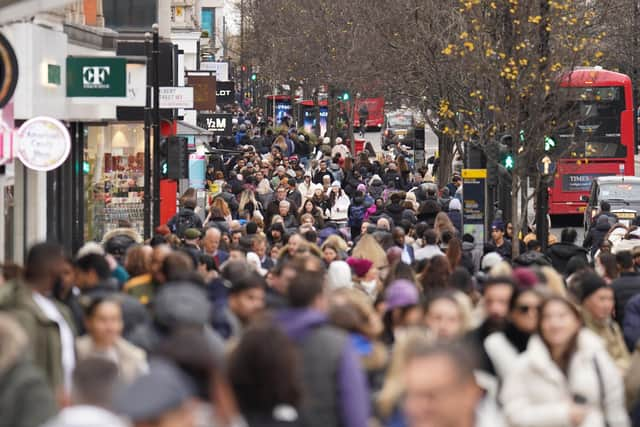Christmas boosts sales but masks nervous festive season for consumers
Total sales increased by 6.9 per cent in December against an increase of 2.1 per cent in December 2021 – well above the three-month average growth of 4.4 per cent and 12-month average growth of 3.1 per cent, according to the British Retail Consortium (BRC)-KPMG Retail Sales Monitor.
UK retail sales increased 6.5 per cent on a like-for-like basis from December 2021, when they had increased by 0.6 per cent.
Advertisement
Hide AdAdvertisement
Hide AdHowever, the rise in sales masked a significant drop in volumes considering historically record inflation.


Consumers shunned big ticket technology purchases in December, opting for energy efficient household appliances and Christmas mainstays of clothes and beauty items.
Food sales were also strong, growing nearly 8 per cent year-on-year as families gathered at home to make the most of an unrestricted Christmas.
Despite the bad weather, and with postal strikes ongoing, shoppers opted to head for the high street to browse for Christmas presents, with online sales growth continuing to slide across a number of categories.
Advertisement
Hide AdAdvertisement
Hide AdAcross last year overall, total UK retail sales increased by 3.1 per cent on 2021, while food growth reached 3 per cent and non-food growth hit 3.2 per cent.
BRC chief executive Helen Dickinson said: “After an exceptionally challenging year which saw inflation climb and consumer confidence plummet, the uptick in spending over Christmas gave many retailers cause for cheer.
“Nonetheless, despite the stronger sales, growth remained below inflation, making December the ninth consecutive month of falling volumes.
“Retail faces further headwinds in 2023. Cost pressures show little immediate signs of waning, and consumer spending will be further constrained by increasing living costs.”
Advertisement
Hide AdAdvertisement
Hide AdMeanwhile, figures from Barclays show consumer card spending grew 4.4 per cent year-on-year in December – slightly higher than in November (3.9 per cent), but well below the 9.3 per cent rise in consumer price inflation.
Hospitality and travel received a boost from Christmas parties, the football World Cup and 2023 holiday bookings, while the cold snap saw spending on utilities climb even higher, and postal strikes hampered online retail, meaning shoppers headed to the high street for last-minute gifts.
Esme Harwood, director at Barclays, said: “The retail, travel and hospitality sectors all saw noticeable growth in December. Sports and outdoor retailers saw their largest increase since March 2022 as many Brits sought to get a head start on their January health kick. Meanwhile, pubs, bars and clubs benefited from Christmas parties and football fans watching the World Cup.
“However, it’s worth noting that these figures look more positive in comparison to December 2021, as the spread of Omicron kept Brits away from high streets and hospitality venues. It seems this year shoppers returned to the high street to make the most of the festive period despite the cost-of-living challenges.”